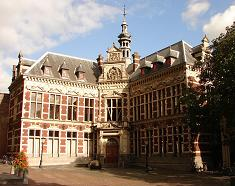Speaker
Andrea Beraudo
(Universita e INFN (IT))
Description
We present the updated outcomes of a theoretical study of heavy-flavor spectra in AA collisions. The core of the analysis is represented by the study of the propagation of heavy (c and b) quarks in the Quark Gluon Plasma: their dynamics is described through a relativistic Langevin equation, whose transport coefficients are evaluated within a thermal-field-theory approach. Results obtained with lattice-QCD transport coefficients will be also shown. Our Langevin approach, at variance with radiative energy-loss calculations, would lead (asymptotically) the heavy quarks to thermal equilibrium.
The numerical solution of the Langevin equation enters into a multi-step setup including
- Initial hard production of the q-qbar pairs, given by the POWHEG-BOX event generator (based on NLO pQCD);
- For the AA case: Langevin dynamics in the QGP background (evolving according to hydrodynamics);
- Hadronization according to the most up-to-date branching fractions and fragmentation functions;
- Decays into the experimentally accessible channels (open charm hadrons, displaced J/psi, heavy-flavor electrons).
- Evaluation of inclusive spectra (in pp and AA), R_AA and v_2 (in AA) and comparison with the most recent experimental results obtained in Pb-Pb collisions at the LHC at 2.76 TeV.
Our analysis represents an improvement of the calculation presented in Eur.Phys.J. C71 (2011) 1666. In particular measurements of exclusive open-charm spectra which became available at the LHC (at 2.76 and 7 TeV) allow now to fix the pp benchmark with tighter constraints.
Author
Andrea Beraudo
(Universita e INFN (IT))
Co-authors
Prof.
Arturo De Pace
(INFN)
Francesco Prino
(Universita e INFN (IT))
Marco Monteno
(Universita e INFN (IT))
Marzia Nardi
(Unknown)
Prof.
alfredo molinari
(Universita' di Torino)
Prof.
wanda maria alberico
(universita' di Torino e INFN)
